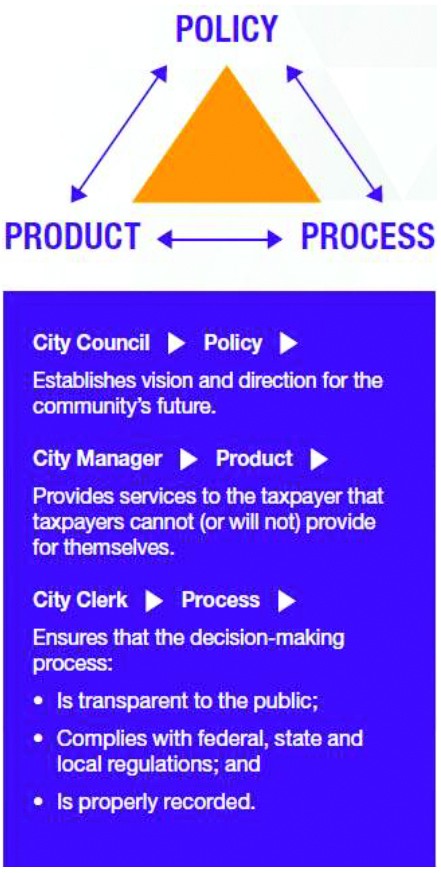City clerk’s role in local government

The role of a municipal clerk is often a misunderstood position in local government. To the uninformed, clerks are often thought to fulfill a primarily clerical role. The importance of the position’s role, however, is quite clear. The tasks are dictated by law or statute and include some of the most basic services expected by residents.
In fact, municipal clerks are often the first and most direct link between residents and government. The position is also responsible for providing transparency in local government.
1. Professionalism. A strong, positive professional relationship between the clerk and the manager is important for effective service delivery to residents. Clerks work behind the scenes to ensure the smooth operation of local government. In order to facilitate this role, the clerk’s office is becoming professionalized.
Many states mandate professional certification to secure or maintain the position of clerk. The International Institute of Municipal Clerks (IIMC) has 5,828 members with active Certified Municipal Clerk and Master Municipal Clerk designations.
Certification through the states and the international organization requires a minimum of 120 hours of in-class training. Some states require a higher standard. Texas, for example, requires 200 hours of independent study and attendance at eight, two-day seminars.
2. Secretariat to the governing body. The clerk position is one of the oldest in local government. When the early colonists came to America, they set up forms of local government to which they had been accustomed, and the office of clerk was one of the first to be established.
Today, as in those first positions, clerks are selected for their attention to detail, as well as their ability to be forward thinking and to anticipate problems. One task associated with this role is to ensure that public meetings are properly posted. This might seem mundane, but is very important.
3. Records management. A clerk is the official keeper of records. This responsibility includes the legal liability associated with tasks that involve enormous legal accountability for a local government. While state and local laws and ordinances may vary with respect to specific tasks and functions, in general clerks maintain official records, documents, vital statistics, and financial records.
They also record and publish council meetings, ordinances, and resolutions; retain custody of the official seal; issue licenses and permits; retain historical records; and record contracts and agreements, bids, deeds, maps, and various licenses.
4. Public information. Clerks are now reporting that fulfilling requests for access to public information is the greatest demand on their time. Thousands of individuals and entities are requesting hundreds of thousands of pieces of public information for a variety of reasons, and state and federal laws dictate that public information be made available to those who request such information.
5. Elections. Clerks are often tasked with administering local elections. This can include such duties as: ensuring that polling places meet standards of accessibility; distributing election supplies and equipment; obtaining lists of registered voters; preparing ballots in the manner dictated by law; processing applications from potential candidates for elected office; properly publicizing elections and results of elections; and properly recording necessary information from the election with state officials. Monte Vista city clerk works with Rio Grande County to coordinate the elections.
6. Other duties as assigned. Clerks also play a role in many other jobs including, holding the role of municipal court clerk, public information officer, assistant to the city manager and the list goes on.
Please contact Unita Vance, city clerk at 719-852-2692 if you have any questions.



